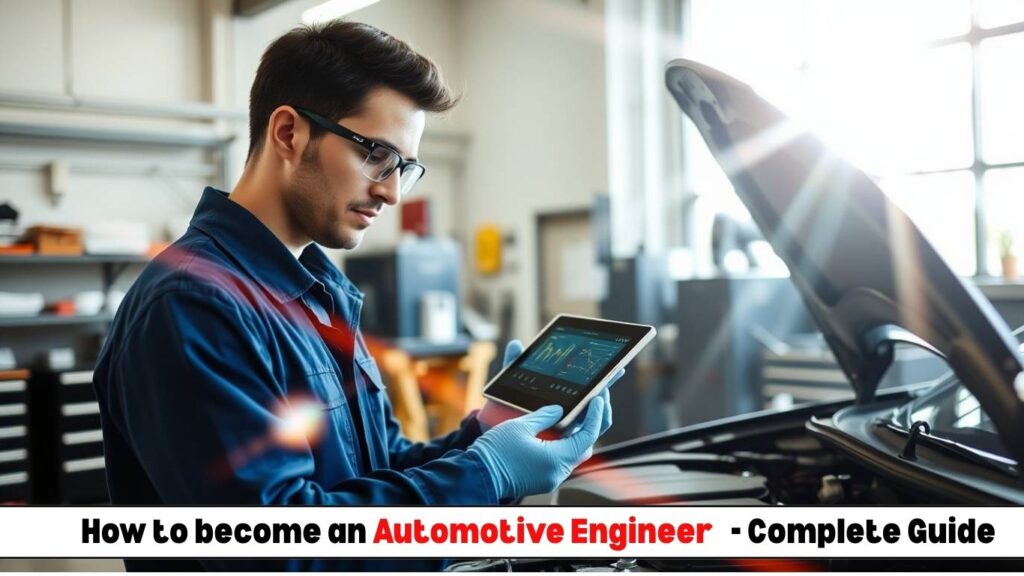
Introduction
Automotive Engineers are the backbone of the automobile industry, designing, developing, and improving vehicles that move the world. From electric cars (EVs) to autonomous vehicles, these professionals blend mechanical, electrical, and software engineering to create safer, smarter, and more efficient transportation.
This comprehensive guide covers:
✅ History of Automotive Engineering
✅ Salary Expectations (Entry-Level to Senior Roles)
✅ Key Roles & Responsibilities
✅ Essential Qualifications & Skills
✅ How to Get Started (Step-by-Step Guide)
✅ Future Trends & Job Outlook
Let’s explore this high-speed career in detail!
1. The History of Automotive Engineering
Early Beginnings (1700s-1800s)
- 1769: Nicolas-Joseph Cugnot built the first steam-powered vehicle.
- 1886: Karl Benz patented the first gasoline-powered car (Benz Patent-Motorwagen).
Mass Production Era (1900s-1950s)
- 1908: Henry Ford’s Model T revolutionized assembly line production.
- 1930s-50s: Advancements in aerodynamics, suspension, and safety features.
Modern Innovations (1960s-Present)
- 1970s: Introduction of electronic fuel injection (EFI) and emission controls.
- 1990s: Rise of computer-aided design (CAD) and hybrid vehicles (Toyota Prius).
- 2000s-Present: Electric vehicles (Tesla), autonomous driving (Waymo), and connected cars.
Today, Automotive Engineers work on AI-driven cars, sustainable mobility, and smart transportation systems.
2. Automotive Engineer Salary Expectations
Salaries vary by experience, specialization, and location:
| Experience Level | Average Salary (Annual) |
|---|---|
| Entry-Level (0-2 yrs) | $60,000 – $80,000 |
| Mid-Level (3-7 yrs) | $80,000 – $110,000 |
| Senior-Level (8+ yrs) | $110,000 – $150,000+ |
| Lead/Managerial Roles | $130,000 – $200,000+ |
Top-Paying Industries
✔ Electric Vehicle (EV) Companies (Tesla, Rivian) – $90K-$160K
✔ Luxury & Performance Cars (BMW, Mercedes) – $85K-$140K
✔ Autonomous Vehicle Tech (Waymo, Cruise) – $100K-$180K
✔ Motorsports (F1, NASCAR) – $70K-$150K
Note: Germany, Japan, and the U.S. offer the highest salaries.
3. Roles & Responsibilities of an Automotive Engineer
A. Vehicle Design & Development
- Use CAD software (SolidWorks, CATIA) to design car components.
- Optimize aerodynamics, fuel efficiency, and safety.
B. Testing & Validation
- Conduct crash tests, wind tunnel tests, and durability tests.
- Analyze data using MATLAB, ANSYS, or LabVIEW.
C. Powertrain & Electrification
- Develop engines, transmissions, and EV batteries.
- Work on hybrid/electric propulsion systems.
D. Autonomous & Connected Vehicles
- Program self-driving algorithms (LiDAR, AI perception systems).
- Integrate vehicle-to-everything (V2X) communication.
E. Manufacturing & Production
- Improve assembly line efficiency using robotics.
- Ensure compliance with emission and safety regulations.
4. Qualifications & Skills Required
A. Educational Background
- Bachelor’s Degree in:
- Mechanical/Automotive Engineering (Most common)
- Electrical/Computer Engineering (For EVs & autonomous tech)
- Master’s/Ph.D. for R&D or specialized roles.
B. Certifications (Optional but Valuable)
✔ SAE International Certifications (e.g., Automotive Engineering Academy)
✔ ASE Certification (For testing & maintenance roles)
✔ PMI Project Management Professional (PMP) (For managerial roles)
C. Technical Skills
✔ CAD/CAE Tools: SolidWorks, CATIA, ANSYS
✔ Programming: Python, C++, MATLAB (For autonomous systems)
✔ EV & Battery Tech: Knowledge of lithium-ion batteries, charging systems
D. Soft Skills
✔ Problem-Solving & Creativity
✔ Teamwork & Communication
✔ Attention to Detail (Safety-critical designs)
5. How to Get Started as an Automotive Engineer
Step 1: Earn a Relevant Degree
- Pursue a B.Tech/B.E. in Automotive/Mechanical Engineering.
- Take elective courses in EVs, AI, or robotics.
Step 2: Gain Hands-On Experience
- Intern at automakers (Toyota, Ford) or EV startups (Tesla, Lucid Motors).
- Join Formula Student or EcoCAR competitions.
Step 3: Build Technical Expertise
- Master CAD, programming, and data analysis tools.
- Work on personal projects (DIY electric go-kart, autonomous RC car).
Step 4: Apply for Jobs
- Entry-Level Roles:
- Design Engineer
- Test Engineer
- Powertrain Engineer
Step 5: Advance Your Career
- Specialize in EVs, autonomous tech, or motorsports.
- Pursue an MBA for leadership roles (Product Manager, Technical Director).
6. Future of Automotive Engineering
Emerging Trends
🚀 Electric Vehicles (EVs): Solid-state batteries, ultra-fast charging.
🚀 Autonomous Driving: Level 5 self-driving cars (no human input).
🚀 Connected Cars: 5G-enabled vehicle communication.
🚀 Sustainable Manufacturing: Recycled materials, hydrogen fuel cells.
Job Outlook
- 5-7% growth by 2030 (steady demand).
- High demand for EV, AI, and battery specialists.
Final Thoughts: Is Automotive Engineering Right for You?
This career is ideal if you:
✓ Love cars and cutting-edge technology
✓ Enjoy problem-solving and innovation
✓ Want to shape the future of transportation
Pro Tip: Learn AI/ML and battery tech to future-proof your career.
Ready to Hit the Road?
📌 Comment below for free learning resources!
📌 Share this guide with aspiring engineers!













Post Comment